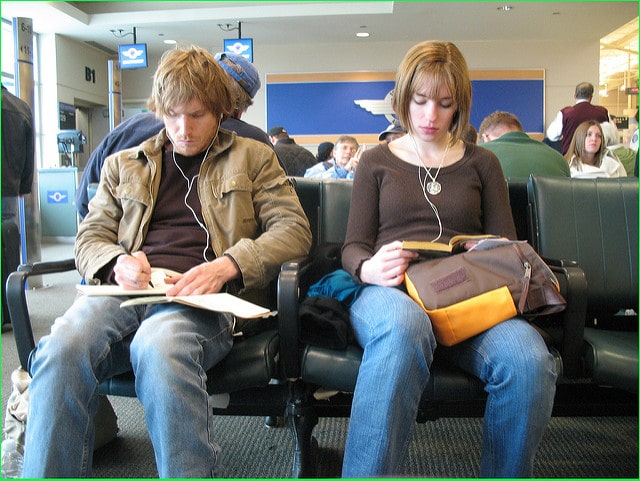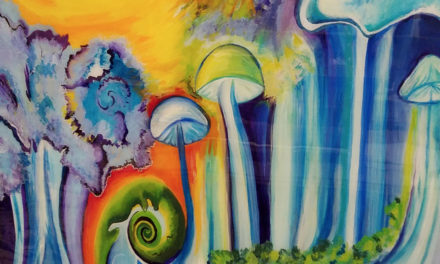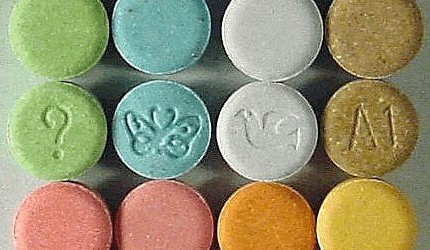
Millennials have specific psychological needs that psychedelic therapy may be uniquely helpful in treating. Image source: Flickr user theeErin
Being on the upper age of the millennial generation, I often assume I have little in common with current college students and recent graduates. But when I look at the basic psycho-social issues that confront the millennial generation—increased anxiety and depression, heavy use of technology, and increased susceptibility to addiction— I realize I am definitely part of this generation. After all, I check my Facebook almost compulsively, I have work emails pushed to my personal phone, and I have dealt with mood disorders throughout my life. Sadly, these are all markers of millennials facing unique social constructs brought by increased global connectivity and technological saturation.
Fortunately, we, as a generation, recognize our position and are becoming less afraid to ask for help when necessary. With the stigma against therapy and mental health medication fading somewhat, the mental health field is slowly expanding to include newer, more targeted answers for younger individuals. Perhaps that is one reason why there has been a resurgence in research regarding the use of psychedelics in therapeutic settings— because millennials and their therapists recognize that psychedelics can help us in ways that traditional therapy may not.
Recognition and Control of the Ego
As millennials, we tend to put a high value on outward appearances, and our sense of self-worth depends on the recognition we receive from others. While the need for outside verification is not new to our generation, the amount we are driven to seek it is unprecedented. Social media sites such as Facebook and Instagram demand we appear perfect, and the rise of sites like LinkedIn means that even our professional lives are out there for the world to judge. It is easier than ever to lose our sense of self while trying to obtain the identity we are expected to portray.
Psychedelic therapy can help millennials develop a stronger sense of self through what is commonly referred to as “ego death.” Ego death is described in many different ways, but, essentially, it involves a dissolution of the identity you maintain on a daily basis. Although this state can be reached through meditation and holotropic breathwork, it is most commonly associated with LSD, psilocybin, and DMT. Therapy sessions focusing on ego death tend to involve higher doses of psychedelics, so some patients might find them challenging. But such therapy does help people recognize the aspects of themselves they portray to others and how it relates to their true identity and, in doing so, can assist millennials struggling to develop a strong sense of self-worth in an appearance-focused, technology driven world.
Reduction of Anxiety
Depression and anxiety have both become more prevalent in recent years. Although some people argue these conditions are just diagnosed more and rates have not actually risen, experts say the average high school student experiences the same level of anxiety as mental health patients in the 1950’s. And this anxiety is based in valid reasons; a difficult job market, external pressure to be successful, and a cultivated need to be seen as special can all take their toll on young people. These outside pressures—in addition to negative habits like reduced sleep and a sedentary lifestyle—create a perfect breeding ground for anxiety.
Several psychedelics have been shown to be useful in treating various forms of anxiety. MDMA is currently undergoing promising studies in the treatment of PTSD, and both psilocybin and LSD have been shown to reduce anxiety in terminally ill patients. But regardless of the specific form of the anxiety, psychedelics decrease the functioning of the amygdala, which creates feelings of fear and anxiety. At the same time, they stimulate the ventromedial prefrontal cortex, responsible for processing fear and lowering stress. When combined with therapy, these physical reactions to psychedelics can allow individuals to confront the sources of their anxiety and, ultimately, learn to control it. While this is very promising, further research is needed regarding psychedelics and general anxiety in order to determine the best treatment methods for millennials.
Control Over Addictions
Millennials are actually at a slightly lower risk of becoming addicted to illicit substances compared to the generations before us. But just because our addictions may not involve hard drugs does not mean we are not susceptible. In fact, millennials have greater susceptibility to behavioral addictions, including addiction to smartphones, computers, movies, and shopping. And because of our cultural drive for perfection, we may be more likely to abuse performance enhancing substances like prescription drugs, caffeine, and nicotine. These substances, while helping us get ahead in school and work, can ultimately lead to increased anxiety and other personal problems.
Many traditional addiction treatments rely on addressing the physical factors of dependency and only address the social and behavioral factors secondarily. While some psychedelics—such as kambo—may address the physical aspect of addiction by cleansing the body of addictive substances, most psychedelics address the psycho-social reasons behind addiction. And while many substances are effective at treating physical addictions such as smoking and alcoholism, psychedelics are the only current medicinal option being pursued for treating non-physical addictions like media addiction. Of course, psychedelic treatment would still have to be paired with traditional forms of therapy to be effective in treating non-physical addictions, but if millennial addiction is being caused by a lack of authentic social connection and the pressure to appear perfect, psychedelic therapy may be the best option for treating these addictions at their psycho-social roots.
Developing Stronger Relationship Skills
As millennials, we are often caught in a strange paradox when it comes to interpersonal relationships. More than past generations, we crave social connection and value friends and family. At the same time, we often struggle to form authentic relationships due to higher levels of migration and vague communication filtered through various forms of technology. Because of this, we need to concentrate on building healthy social skills and developing deep, meaningful relationships.
For people struggling to make real connections, MDMA therapy could help. MDMA has been discussed as a potential tool for increasing the effectiveness of couples therapy because it creates prosocial feelings, trust, and openness in users, which can allow couples to have deeper, more meaningful and honest therapy sessions. At the same time, it could be helpful for individuals who need to work through social anxiety or trust issues one-on-one with a therapist before engaging in healthy relationships.
While psychedelic therapy may not hold all the answers for the psycho-social problems millennials deal with, it certainly holds great promise to positively influence the millennial lifestyle in various ways. I don’t believe it’s a coincidence that, just as millennials are facing some of their most difficult challenges, research into psychedelic therapy is undergoing a resurgence. With the idea that MDMA may be approved for therapeutic use by 2021, and the current popularity of non-controlled substances such as kambo, millennials have reason to hope that psychedelic therapy will soon become more widely available to help us address the many psycho-social challenges our generation is facing.









